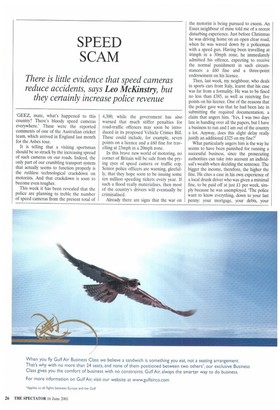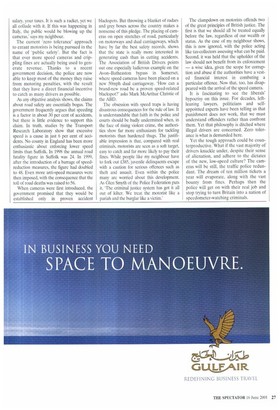SPEED SCAM
There is little evidence that speed cameras
reduce accidents, says Leo McKinstiy, but
they certainly increase police revenue
'GEEZ, mate, what's happened to this country? There's bloody speed cameras everywhere.' These were the reported comments of one of the Australian cricket team, which arrived in England last month for the Ashes tour.
It is telling that a visiting sportsman should be so struck by the increasing spread of such cameras on our roads. Indeed, the only part of our crumbling transport system that actually seems to function properly is the ruthless technological crackdown on motorists. And that crackdown is soon to become even tougher.
This week it has been revealed that the police are planning to treble the number of speed cameras from the present total of 4,300, while the government has also warned that much stiffer penalties for road-traffic offences may soon be introduced in its proposed Vehicle Crimes Bill. These could include, for example, seven points on a licence and a £60 fine for travelling at 23mph in a 20mph zone.
In this brave new world of motoring, no corner of Britain will be safe from the prying eyes of speed camera or traffic cop. Senior police officers are warning, gleefully, that they hope soon to be issuing some ten million speeding tickets every year. If such a flood really materialises, then most of the country's drivers will eventually be criminalised.
Already there are signs that the war on the motorist is being pursued to excess. An Essex neighbour of mine told me of a recent disturbing experience. Just before Christmas he was driving home on an open clear road, when he was waved down by a policeman with a speed gun. Having been travelling at 46mph in a 30mph zone, he immediately admitted his offence, expecting to receive the normal punishment in such circumstances: a £60 fine and a three-point endorsement on his licence.
Then, last week, my neighbour, who deals in sports cars from Italy, learnt that his case was far from a formality. He was to be fined no less than £385, as well as receiving five points on his licence. One of the reasons that the police gave was that he had been late in submitting the required documentation, a claim that angers him. 'Yes, I was two days late in handing over all the papers, but I have a business to run and I am out of the country a lot. Anyway, does this slight delay really justify an additional £325 on my fine?'
What particularly angers him is the way he seems to have been punished for running a successful business, since the prosecuting authorities can take into account an individual's wealth when deciding the sentence. The bigger the income, therefore, the higher the fine. He cites a case in his own experience of a local drunk driver who was given a minimal fine, to be paid off at just £1 per week, simply because he was unemployed. 'The police want to know everything, down to your last penny: your mortgage, your debts, your salary, your taxes. It is such a racket, yet we all collude with it. If this was happening in Italy, the public would be blowing up the cameras.' says my neighbour.
The current 'zero tolerance' approach to errant motorists is being pursued in the name of 'public safety'. But the fact is that ever more speed cameras and crippling fines are actually being used to generate revenue. Thanks to a recent government decision, the police are now able to keep most of the money they raise from motoring penalties, with the result that they have a direct financial incentive to catch as many drivers as possible.
As any objective analysis shows, the claims about road safety are essentially bogus. The government frequently argues that speeding is a factor in about 30 per cent of accidents, but there is little evidence to support this claim. In truth, studies by the Transport Research Laboratory show that excessive speed is a cause in just 6 per cent of accidents. No county in England has been more enthusiastic about enforcing lower speed limits than Suffolk. In 1998 the annual road fatality figure in Suffolk was 24. In 1999, after the introduction of a barrage of speedreduction measures, the figure had doubled to 48. Even more anti-speed measures were then imposed, with the consequence that the toll of road deaths was raised to 56.
When cameras were first introduced, the government promised that they would be established only in proven accident blackspots. But throwing a blanket of radars and grey boxes across the country makes a nonsense of this pledge. The placing of cameras on open stretches of road, particularly on motorways and dual carriageways, which have by far the best safety records, shows that the state is really more interested in generating cash than in cutting accidents. The Association of British Drivers points out one especially ludicrous example on the Avon-Batheaston bypass in Somerset, where speed cameras have been placed on a new 50mph dual carriageway. 'How can a brand-new road be a proven speed-related blackspot?' asks Mark McArthur Christie of the ABD.
The obsession with speed traps is having disastrous consequences for the rule of law. It is understandable that faith in the police and courts should be badly undermined when, in the face of rising violent crime, the authorities show far more enthusiasm for tackling motorists than hardened thugs. The justifiable impression is that, compared with real criminals, motorists are seen as a soft target, easy to catch and far more likely to pay their fines. While people like my neighbour have to fork out £385, juvenile delinquents escape with a caution for serious offences such as theft and assault. Even within the police many are worried about this development. As Glen Smyth of the Police Federation puts it, 'The criminal justice system has got it all out of kilter. We treat the motorist like a pariah and the burglar like a victim.' The clampdown on motorists offends two of the great principles of British justice. The first is that we should all be treated equally before the law, regardless of our wealth or status. As the case of my neighbour shows, this is now ignored, with the police acting like tax-collectors assessing what can be paid. Second, it was held that the upholder of the law should not benefit from its enforcement — a wise idea, given the scope for corruption and abuse if the authorities have a vested financial interest in combating a particular offence. Now that, too, has disappeared with the arrival of the speed camera.
It is fascinating to see the liberals' hypocrisy on this issue. For decades, leftleaning lawyers, politicians and selfappointed experts have been telling us that punishment does not work, that we must understand offenders rather than confront them. Yet that philosophy is ditched where illegal drivers are concerned. Zero tolerance is what is demanded here.
Yet the tough approach could be counterproductive. What if the vast majority of drivers knuckle under, despite their sense of alienation, and adhere to the dictates of the new, low-speed culture? The cameras will be still, the traffic police redundant. The dream of ten million tickets a year will evaporate, along with the vast bounty from fines. Perhaps then the police will get on with their real job and stop trying to turn Britain into a nation of speedometer-watching criminals.



































































 Previous page
Previous page